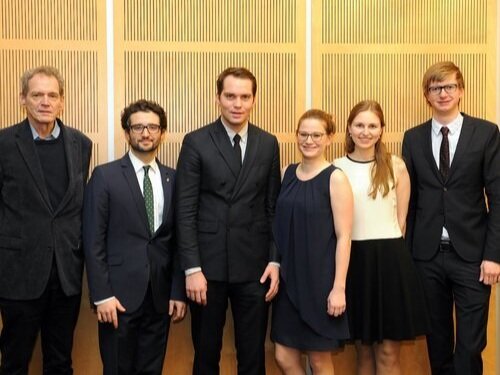Obermayer German Jewish History Award
Jürgen Sielemann
Hamburg
Just as Hamburg’s harbor once served as the gateway to a new future for millions of emigrants, the city’s archive today is the entrance hall for journeys to the past. Its doorkeeper is Jürgen Sielemann, a 59-year-old expert on the history of Jews and other minorities in Hamburg. His activities, however, have gone far beyond what his archival job requires. Widely considered a leader in Jewish genealogy in Germany, he has helped thousands open doors to this history, even in times when others wanted to keep them closed. Thanks to his initiative and persistence, the archive had a leading role in opening new sources for historical research. Other essential genealogical files were made accessible through an Internet database. He founded Germany’s first and only society for Jewish genealogy and was an inspiration for research. His gedenkbuch (memorial book) commemorates nearly 9,000 victims.
A Hamburg native, Sielemann’s speech and manner hint at a man of encyclopedic knowledge and firm conviction; his politeness is tempered by short bursts of laughter and a dry sense of humor, well-known to those who have worked with him. “Calm and unperturbed, he does his work without making a fuss about it, but he does not rest until everything is finished,” says Gabriela Fenyes, a journalist and former member of the executive council for Hamburg’s Jewish congregation.
Since the 1970s, he has filled many file folders with correspondence to genealogists and ex-Hamburgers, from research he did in his spare time. He had wanted to institutionalize this network of relationships for decades and succeeded in 1996, when he initiated the founding of the Hamburg Society for Jewish Genealogy. He served as its leader until 2001 and is still the vice president.
One person grateful for his efforts is Miriam Gillis-Carlebach, the daughter of Hamburg’s last rabbi. After 45 years, she returned from Israel to her birthplace to research the fate of her family. With Sielemann’s help, she found the name of the non-Jewish family who lived in the same flat as her parents until their deportation. She was eager to meet them, but also anxious. “I didn’t know how to get there, so he went with me,” she says, “and he even brought flowers to make the extremely exciting meeting somehow easier for me.”
For a long time, however, his personal commitment found little support. He started his professional career at the Hamburg state archive in 1966 because of a general interest in history, and “half by chance” he chose Jews and other minorities as his field of responsibility. In charge of something regarded as an unpleasant subject among some colleagues and historians—just as it was generally at that time— Sielemann’s services were seldom requested. “I felt like an outsider—like on an island,” he remembers. In the midst of the silence surrounding him, the survivors who contacted him at work and the sources he studied confronted him with the past. “I soon realized what contributions the Jewish communities once had made to Germany,” he recalls, “and I saw how, after the war as well, Jews were treated abjectly.”
Sielemann has taught since the 1980s about emigration from Hamburg and the importance of the sources available in the Hamburg archive. Recently, he initiated a project to post on a Web site the complete lists of the 5 million emigrants, mostly from Eastern Europe, who came through the port of Hamburg, a boon to anyone researching family history. He also tries to broaden the basis for historical research. “Due to his persistence and efforts for many years, the files of the Oberfinanz-direktion, a fundamentally important source for research on the Nazi party, came to the state archive,” explains Ina Lorenz, vice president of the Hamburg Institute for the History of German Jews. “He doesn’t put himself in the foreground, but he is the one who does the most crucial work.” The Hamburg Jewish community entrusted its post-war files to the archive.
Having learned early on that Hamburg once had a large Jewish community, genealogy became, in Sielemann’s eyes, a way to explore German-Jewish history and identity. “I wanted to bring back an institution to Hamburg that already existed before Nazi times and that was a piece of Jewish culture,” he says. “To date, I haven’t spread the idea of a genealogical society to other cities in Germany, but I’m optimistic that it will happen.”
THIS WALL BRINGS PEOPLE TOGETHER
Students at this Berlin elementary school, built on the site of a synagogue, have been building a wall for the past two decades. It delivers a powerful message about community.
STUDENTS REACHING STUDENTS
When a handful of ninth graders from Berlin met Rolf Joseph in 2003, they were inspired by his harrowing tales of surviving the Holocaust. So inspired that they wrote a popular book about his life. Today the Joseph Group helps students educate each other on Jewish history.
“I SPEAK FOR THOSE WHO CANNOT SPEAK”
Margot Friedländer’s autobiography details her struggles as a Jew hiding in Berlin during World War II. Now 96, she speaks powerfully about the events that shaped her life and their relevance today.



